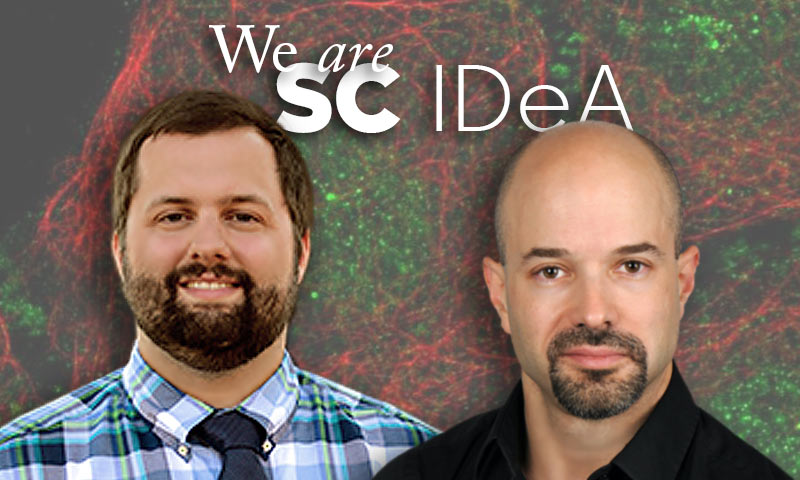Two SC IDeA Researchers receive NIH NIGMS Collaboration Award

SC INBRE is pleased to announce that a team of South Carolina biomedical researchers has received an NIH NIGMS collaboration award. This goal of this one-year funding opportunity is to encourage collaborations between IDeA programs investigators while providing students a broad continuum of research opportunities. The team of Dr. Austin Shull from Presbyterian College and Dr. Antonis Kourtidis from the Medical University of South Carolina were awarded approx. $120,000 for their project. Dr. Shull is a current recipient of an SC INBRE Developmental Research Project Program (DRP) award; Dr. Kourtidis is a member of CDLD [Center for Biomedical Research Excellence (COBRE) in Digestive and Liver Disease]. This is the third consecutive year NIH NIGMS has offered collaborative awards and the third consecutive team from South Carolina to have received one.
As described in the project proposal, “Loss of epithelial integrity is common in cancer. However, mechanistic understanding of how compromised epithelial architecture promotes aberrant cell behavior, is still incomplete.” The collaboration team will be investigating a novel functional interaction between the adherens junctions, which are guardians of epithelial integrity, with ribonucleoprotein complexes, which has the potential to significantly advance their knowledge in the field. “Collectively, the experimental approach will aide in making considerable strides for understanding the downstream intracellular consequences that induce a mesenchymal-like cancer cell state when disrupting the adherens complex via PLEKHA7 suppression.”
Said the collaborators, “Since meeting at an SC INBRE Symposium in Columbia, SC in 2020, we have been in communication about initiating a collaborative research project between our labs which will advance our mutual interests in investigating the molecular consequences in disrupting cell-cell junction in epithelial cells that contribute to cancer progression. This collaborative project will support the long-term trajectory of our labs by leveraging our different research backgrounds and combining our technical expertise to address fundamental gaps in the field’s current knowledge about the molecular changes that take place during disruption of cell junctions. In addition, the findings from this project will serve as critical pilot data for a larger follow-up proposal to support this collaborative work.”
Presbyterian College undergrads will perform the vast majority of experiments and data analysis. Dr. Shull has a strong track record of mentoring undergrads with many students being leading presenters of their personal work at national meetings (ex: American Association for Cancer Research). Shull is fully committed to continuing his mentorship of undergrads and advancing their exposure to novel techniques, growing research areas, and quality experts within their respective fields through this collaborative project. For the first Aim of this project (COBRE Investigator-led efforts – Examine increased mRNA translation activity in PLEKHA7-depleted epithelial cells), Presbyterian College undergrads (along with Shull) will travel to MUSC to perform experiments under the training and guidance of Dr. Kourtidis. The students will be able to leverage the expertise of the MUSC Cell Models Core in developing gene-edited cell lines pertinent for the proposal. For the second Aim (INBRE investigator-led efforts – Determine the DNA methylation changes caused by translocation of PIWIL2 from the adherens junctions to the nucleus), Presbyterian College undergrads will perform experiments at Presbyterian College under the guidance of Shull with samples received from MUSC.
